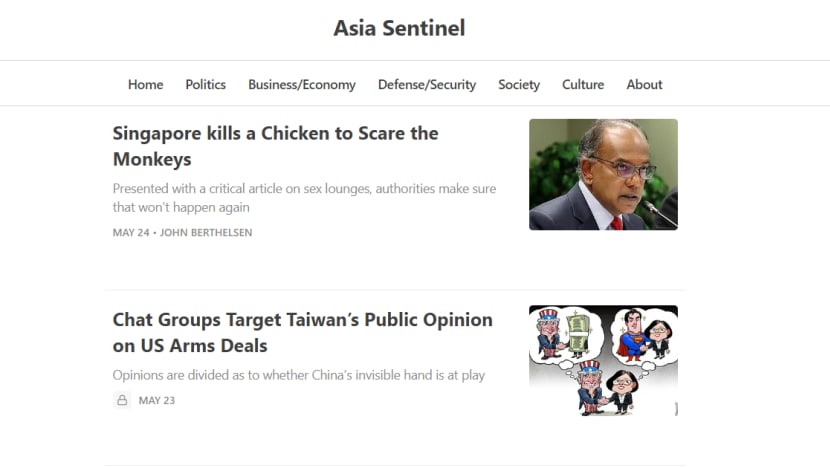Singapore to block Asia Sentinel website for not complying with POFMA correction direction
The access blocking orders will be cancelled should Asia Sentinel subsequently comply with the "full requirements" of the correction direction, the Ministry of Communications and Information (MCI) said.

A screengrab of the homepage of online publication Asia Sentinel on May 26, 2023.
SINGAPORE: Internet access service providers in Singapore have been ordered to block the online publication Asia Sentinel after its non-compliance with a correction direction under the Protection from Online Falsehoods and Manipulation Act (POFMA), the Ministry of Communications and Information (MCI) said on Friday (Jun 2).
The California-registered publication was required to carry a correction notice alongside its May 24 article, which the Ministry of Home Affairs (MHA) said contained several falsehoods.
The Infocomm Media Development Authority has been directed to issue access blocking orders following Asia Sentinel’s non-compliance with the correction direction, MCI said in its press release on Friday.
MCI said that the correction direction issued to Asia Sentinel required the facts to be juxtaposed against the falsehoods, so that end-users in Singapore can read both versions and draw their own conclusions.
"While Asia Sentinel carried the correction notices, this was not done in compliance with the requirements of the correction direction for the respective correction notices to be situated at the top of the article and at the top of the main page of the website,” MCI added.
The access blocking orders require internet access service providers to disable access for end-users in Singapore to the online location where the falsehoods were communicated, it said.
The access blocking orders will be cancelled should Asia Sentinel subsequently comply with the "full requirements" of the correction direction.
MHA reiterated earlier on Friday that Asia Sentinel did not have to take down its May 24 article and the online publication was only required to post the correction notice in the manner that has been stipulated.
"If Asia Sentinel truly believes in free speech, it should be happy for its readers to read both the article and the correction notice, and make up their own minds which is true," the ministry said.
POFMA’s primary tool to correct falsehoods is via a correction notice, "which must be placed in a specified proximity to the original post with a link to the government’s clarification", according to MHA.
"This is akin to the right of reply practised by newspapers and magazines."
Similar requirements have been placed on other recipients of correction directions and they have complied, MHA noted.
The ministry added that the government may have to take "further action" if Asia Sentinel does not comply with the correction direction.
A check by CNA at 3.30pm on Friday found that the correction notice on Asia Sentinel's article was placed below an editor's note which stated the online publication was "reserving the right to answer their (the Singapore government's) demand at a future time" and that "we stand by our story".
The correction notice was also not carried at the top of the main page of its website.
False statements in Asia Sentinel article
A correction direction under the Protection from Online Falsehoods and Manipulation Act (POFMA) was issued to Asia Sentinel on May 26 over "false statements of fact" made in its May 24 article titled Singapore kills a Chicken to Scare the Monkeys.
The article was written by editor John Berthelsen, and interviewed Andy Wong Min Jun, the author of a 2021 commentary in Nikkei Asia that criticised Singapore's handling of KTV lounges amid the COVID-19 pandemic.
Berthelsen wrote that Wong had been "forced into exile" after, and drew parallels between his situation and that of others like lawyer M Ravi and Lee Hsien Yang, the brother of Singapore's Prime Minister Lee Hsien Loong.
MHA said on May 26 that Asia Sentinel's article contained several falsehoods.
These include claiming that Mr Ravi was suspended from practising law for five years because he had criticised the Singapore government, and that Mr Lee Hsien Yang and his wife Mrs Lee Suet Fern were forced to leave Singapore because government action was threatened against them for "warring" with Mr Lee Hsien Loong.
Another false statement was that the Singapore government, in the aftermath of Wong's piece, had threatened to end Nikkei's business operations in the country, said MHA.
"Nikkei Asia published the Ministry of Home Affairs’ response as a letter to the editor (Singapore says commentary on KTV outbreak is full of inaccuracies) on July 29, 2021. At no point did the Singapore government threaten to end Nikkei’s operations in Singapore," MHA said on May 26.
On Mr Ravi's suspension, which was applied in March, MHA said this was because the Court of Three Judges had found that his various allegations against the Attorney-General, Deputy Attorney-General, prosecutors and the Law Society, had "recklessly and baselessly undermined" the pillars of Singapore’s legal system.
Regarding Mr Lee Hsien Yang and his wife, the ministry said the pair left Singapore after the police engaged them for an investigation.
They had declined to attend a police interview in July 2022 relating to lying in judicial proceedings about the late Mr Lee Kuan Yew's will.












